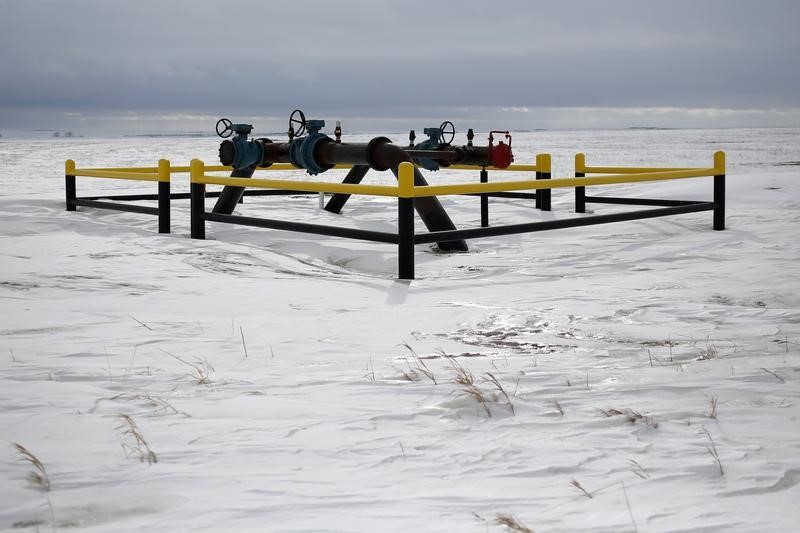By Ernest Scheyder
BISMARCK, N.D. (Reuters) - Tumbling U.S. oil markets hit an important if obscure milestone on Thursday, closing for the first time at a price that could trigger a $5.3 billion, two-year tax break for North Dakota oil drillers as soon as next summer.
Under a decades-old law, the state at the heart of the U.S. shale oil boom would waive its 6.5 percent oil extraction tax once the average monthly price of benchmark West Texas Intermediate (WTI) crude at Cushing, Oklahoma, falls below a certain threshold for five consecutive months.
For next year, that price is $55.08 per barrel. On Thursday, U.S. crude oil futures settled at $54.11 per barrel, the lowest close since May 2009 and the latest leg of a rout that has halved the price of crude since June.
It is unlikely that the clock would start ticking in December, since the average price is still above $61 a barrel. But if prices remain this low into next year, it could be a reality as soon as next June.
"We're really at the point where we could start calculating this," Ryan Rauschenberger, North Dakota's tax commissioner, said in an interview.
The hope of a future tax break will be cold comfort for North Dakota's beleaguered oil producers, including Continental Resources Inc and Oasis Petroleum Inc, which plan to spend less money in 2015.
The tax break "would be an important incentive for the industry to continue investing," said Ron Ness, president of the North Dakota Petroleum Council, an industry trade group.
The potential tax relief could make it difficult to know how much crashing oil prices are hurting the nation's oil producers. It also would muddy the waters to determine how quickly a slowdown in U.S. production affects a growing global supply glut.
While only about 3 percent of oil taxes go to fund the state's day-to-day operations, a reduction would wreak havoc with parts of the state's budget and crimp funding for new schools, water pipelines and other major projects in western oil-producing counties that have made North Dakota the second-largest U.S. oil producer.
Rauschenberger estimates that North Dakota would only take in $2.9 billion in oil taxes in the next two years without the oil extraction tax. With the tax, the projection is $8.2 billion.
SEEN IT BEFORE
The tax break was instituted in 1987, several years after North Dakota's second oil boom went bust. Oil prices had collapsed after Saudi Arabia flooded the market in a price war with other producers - a scenario some see repeating now.
The break was designed "to try and keep oil production occurring in the state in a low-price environment," said Rauschenberger, who was appointed tax commissioner last year and elected to a four-year term last month.
From 1987 until 2004, the trigger was in effect, meaning oil extraction tax collections were a pittance compared with, say, this past July, when $325 million in oil taxes rolled into state coffers, the highest monthly amount in history.
Here is how it works.
If the average price of crude is below an inflation-adjusted limit - set at $55.08 per barrel for 2015 - for five consecutive months, then the 6.5 percent oil extraction tax is waived for the first 24 months of a well's life.
After that 24 months is up, and if the average price of oil is still below $55.08 per barrel, the tax rate rises to 4 percent, not the original 6.5 percent.
The full 6.5 percent oil extraction tax only returns if the average price of oil rises above that $55.08 per barrel threshold each month for a five-month period. The break does not apply to wells already in production, however.
The state still imposes a separate 5 percent gross production tax as a type of property tax on each barrel, no matter what.
But a complete repeal of the 6.5 percent extraction tax would mean North Dakota's "overall oil tax rate would be effectively cut in half," Rauschenberger said.
(Reporting by Ernest Scheyder; Editing by Jonathan Leff and Lisa Shumaker)
